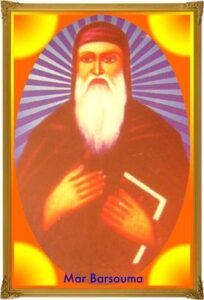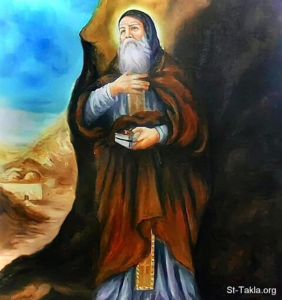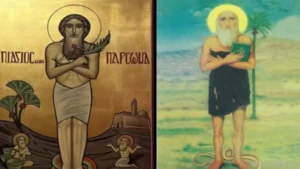St. Barsauma : Son of Fasting, Chief of Mourners A Great Monk, Bishop, Teacher and Archimandrite | Feb 3

St. Barsauma (Barsuma/Barsoma) was born in 380 A.D. in the village of Autan (Otan, Awtan or Wetan) near Samosata (Shmeeshat) an ancient city on the right (west) bank of the Euphrates. His parents were Hanock and Zachia. As a child, Barsauma went with his relatives to Samosata, for a festival. He was found alone on the bank of Euphrates, crying. A monk by name Abraham met him and asked: “Why are you crying?” Barsauma replied: “I want to be the slave of Jesus Christ, our Lord.” The holy hermit, Abraham prevented him from doing this with the reason that he was still too young. But he insisted to live in solitude, in the desert, having a monastic life. Later, Abraham took him to the monastery and taught him ascetic practices. Abraham became his spiritual father. St. Barsauma joined other young people for six years as a monk and student of this holy hermit. His teacher Abraham, the ascetic, departed for heavenly abode around AD 409.

When he was still young, St. Barsauma made his first pilgrimage to Jerusalem barefoot and without provisions. There he was persecuted by the pagans. After his return from Jerusalem, he settled on a barren hill on the border of Armenia. Since it snowed there often, he lived in great distress. The grace of God and his providence showed him a crevice where he could live. One day he saw an angel of God and a pillar of fire protecting his cave. Then, many people came to him and became his disciples. When his disciples were sitting to have their meal, the saint interpreted the words of the Holy Scriptures and wept. The Monastery of Mar Barsauma is near Melitine.
St. Barsauma was very strict with himself. He welcomed suffering and was a great leader of sacrifice. On a summer night Barsauma went out of his room and looked at the shining stars. He thought of his humble self and the mighty creations of God. He decided on that day that he would not sit in the presence of his master. That day onwards he remained standing before the Lord and supported himself on a rock whenever he was tired. He tortured himself before God day and night. He wanted not to lie down until his death. He spent fifty-four years standing in the presence of the Lord. All his life he lived on plants and other greenery that grew on the mountains. Although he was not very eloquent, in the word of God, he was incredibly wise and learned. He was praying and fasting very much, thus he was aptly called “Bar Sauma”, which means “Son of fasting”. Under his robe he wore a dress made of metal; in the winter his body was tortured by the cold, in summer, he was burning with heat. In prayer, he collected his thoughts and sighed from the bottom of his heart. Once, when he was praying, fire came down to him like a flash and became like a tongue, entering his mouth. The prayers he performed was from dawn to dusk in a bowed position. He wept during his prayer until the earth beneath his feet was muddy. He performed many miracles: he drove out demons from people, gave sight to the blind, opened deaf years, healed many of the sickness, cured of any illness and blessed the fruit of their fields and vineyards. Whoever mentioned his name was released from suffering.

Through his prayer, St. Barsauma healed people who were bitten by rabid dogs or snakes. Infertile women, who asked the saint for offspring, gave birth to children. One day he even stopped the sun in the sky, until he and his disciples reached their cave in the mountains. Wherever St. Barsauma celebrated the Holy Mass, the plague stopped and all praised God for his sake. One day, one of his disciples saw how the saint was surrounded by a great light, a large community standing with him in prayer and a Seraph receiving the tears of the saint.
On his second trip to Jerusalem St. Barsauma was accompanied by his disciples, and they came into a pagan city, which had a drought. The pagans demanded of the saint to pray to his God for rain, saying that all of them would be ready to become Christians, if it rained. St. Barsauma went with his disciples in a big yard and began to pray. Suddenly, it rained so hard that the whole city was overflowing from the water. This rain lasted for four days and four nights. Afterwards the pagans turned away from their idols and converted to the Christianity. Then the saint went with his disciples to the holy places and the Sinai Mountain. On his way back he visited St. Simeon Stylite in Antioch.

Once Emperor Marcian gave the order to arrest the saint and bring him to Constantinople, to be judged. But his unjust and impertinent judge suddenly became drastically ill and died after a few days. Then the emperor told him to leave Constantinople, for they were afraid of him. The saint did not want to leave the city. Before leaving the city, the saint sent this message for Empress Pulcheria: “Before I’ll reach my monastery, you will no longer be queen,” for it was she who wanted to emphatically expel the saint from the city. When he left the city, the news reached St. Barsauma that the empress died. Furthermore, a flame of fire came from heaven and burned many houses in the city. St. Barsauma came to Nicomedia, where he spread the creed of the Council of Nicaea. Once he reached the monastery, he performed countless miracles and healed many sick people, and even raised someone from the dead. St. Barsauma supported the right faith and encouraged many people in that difficult time in their hope in God.
Once St. Barsauma visited Emperor Theodosius, on an invitation in Constantinople. The emperor extremely gladly received the saint and asked the saint to become patriarch and for his disciples, by becoming bishop. But the saint replied that it was hard for him to give up his life in the desert. Then the emperor gave him his ring, which had his seal, a sign of power, which the saint accepted humbly. Later, the emperor invited him in writing for the Second Council of Ephesus, which Mar Barsauma attended the as the representative of all Abbots of the East. He was the only member who was not a bishop but had the right to vote. He was given the authority over other monasteries by Emperor. After the death of Theodosius II, the army chief Markkian took charge. Barsauma felt bad about the decision of Chalcedon synod. The Chalcedonians read an order of excommunication of Barsauma, in a Church. Then a prominent person testified that his son was seriously ill. Barsauma’s prayer healed him. The faithful was unanimous in their conviction of the saintly life of Barsauma and Chalcedonians could not do anything. The emperor wrote another letter in which he warned the people to honour St. Barsaumo, the servant of God. In his letter to the bishops the emperor praised the faith and the deeds of Saint Barsauma, for the saint had won the sympathy of the emperor.

St. Barsauma saw in a vision that he would be taken ill and suffer severe pain. After he told this vision to his disciples, he became ill. Then he brought his monks together and spoke four days and four nights without a break with them and blessed them each individually. During the night of February 1, 457/58, the saint lay down and glorified Christ. At that hour, a pillar of fire was seen, which came upon the head of the saint. Before the saint passed away, the earth trembled several times and was saddened by his decease. The prophet and man of wisdom was buried on the 3rd of February, in 457/58, in Syria. Even after his decease, many miracles were wrought. There are miracle reports from the 12th century, which he has performed through the relic of his right hand in his monastery in Malatya. The Orthodox Church remembers him in the fifth Thubden, as chief among mourners. St. Barsauma is commemorated on February 3. The Malankara Orthodox Church has many Churches dedicated to St Barsauma.
0 Comments